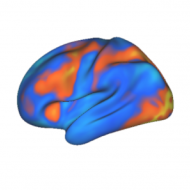Most neurocomputational models are not hard-wired to perform a task. Instead, they are typically equipped with some kind of learning process. In this post, I'll introduce some notions of how neural networks can learn. Understanding learning processes is important for cognitive neuroscience because they may underly the development of cognitive ability. Let's begin with a …
Search results for:
Predicting Intentions: Implications for Free Will
News about a neuroimaging group's attempts to predict intentions hit the wire a few days ago. The major theme was how mindreading might be used for unethical purposes. What about its more profound implications? If your intentions can be predicted before you've even made a conscious decision, then your will must be determined by brain …
Continue reading “Predicting Intentions: Implications for Free Will”
Eliminating Common Misconceptions About fMRI
Most researchers in neuroscience use animal models. Though most neuroscientists are interested in understanding the human brain, they can use more invasive techniques with animal brains. In exchange for these invasive abilities they must assume that other animals are similar enough to humans that they can actually learn something about humans in the process. Functional …
Continue reading “Eliminating Common Misconceptions About fMRI”
Demystifying the Brain
Most neuroscience writing touts statements like 'the human brain is the most complex object in the universe'. This serves only to paint the brain as a mysterious, seemingly unknowable structure. This is somehow comforting to some, but it's not for me. I want to understand this thing! Here are some facts to demystify the brain …
Computational models of cognition in neural systems: WHY?
In my most recent post I gave an overview of the "simple recurrent network" (SRN), but I'd like to take a step back and talk about neuromodeling in general. In particular I'd like to talk about why neuromodeling is going to be instrumental in bringing about the cognitive revolution in neuroscience. A principal goal of …
Continue reading “Computational models of cognition in neural systems: WHY?”
The neural basis of preparation for willful action
My latest scientific publication is entitled Selection and maintenance of stimulus–response rules during preparation and performance of a spatial choice-reaction task (authors: Schumacher, Cole, and D'Esposito). It is a study using functional MRI with humans to investigate how we prepare for and execute willful action. In this post I'll attempt to translate the article's findings …
Continue reading “The neural basis of preparation for willful action”
Pinker on ‘The Mystery of Consciousness’
Time magazine has just published an intriguing article on the neural basis of consciousness. The article was written by Steven Pinker, a cognitive scientist known for his controversial views on language and cognition. Here are several excerpts from the article… On the brain being the basis for consciousness: Scientists have exorcised the ghost from the …
Wandering Minds and the Default Brain Network
Several news articles have come out today which seem to imply that a recent Science report's main finding is that the mind wanders for a purpose (see this Forbes article), and that "daydreaming improves thinking" (see this Cosmos article). These are typical of fabrications used by popular science journalists to pique the public's interest. Mason, …
Continue reading “Wandering Minds and the Default Brain Network”
Brainprints
Normally, neuroscientists try to discover things about the brain, as if it were one monolithic thing. Might the differences between individual brains be important, or useful? A recent article in New Scientist describes recent efforts to use each person's unique brain activity patterns as a kind of fingerprint (or 'brainprint') for security purposes. The system …
Can a Neural Network be Free…
…from a knee-jerk reaction to its immediate input? Although one of the first things that a Neuroscience student learns about is "reflex reactions" such as the patellar reflex (also known as the knee-jerk reflex), the cognitive neuroscientist is interested in the kind of processing that might occur between inputs and outputs in mappings that are …
The Will to be Free, Part I
Freedom to choose is the first axiom of our being. We assume freedom with each action that we take, and we are annoyed when we are forced to act "against our will". A recent article on free will at the New York Times explains that determinism is a direct implication of the brain being the …
Neuroscience Blogs of Note, Part 2
I will follow up MC's recent post with a brief review of three other neuroscience-related blogs that are worth mentioning as we begin Neurevolution. Brain Waves (http://brainwaves.corante.com/) is a self-labeled "neurotechnology" blog. Written by Zack Lynch, it is a real-world look at the effects and benefits derived from neuroscience research with regards to society, culture …
Neuroscience Blogs of Note
As the first post on Neurevolution, I would like to review several other neuroscience blogs that have been around for a while. First is Mind Hacks, a blog by the two authors of the book by the same name. According to the authors, the blog and book include "neuroscience and psychology tricks to find out …
About
About the title: Neurevolution Is it NeurEvolution? Perhaps NeuRevolution? The “Neur” is, of course, in reference to neuron, the basic functional cellular unit of the brain which is thought to be essential for mental function. We remain agnostic as to whether the title refers to either the evolution or revolution of neuroscience, since both denote …
